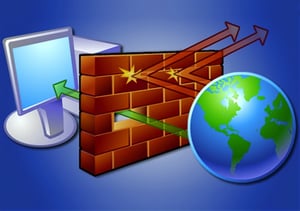 A firewall is software or hardware that sits at the edge of your network, between your company and the Internet. It’s designed to keep hackers out and to allow legitimate connections into your network if needed. Legitimate connections may include access to email, access to a company website or corporate cloud apps.
A firewall is software or hardware that sits at the edge of your network, between your company and the Internet. It’s designed to keep hackers out and to allow legitimate connections into your network if needed. Legitimate connections may include access to email, access to a company website or corporate cloud apps.
A firewall acts a lot like a traffic cop: it stops you at the edge, decides whether or not to allow the traffic that’s coming into or leaving the network based on a pre-defined set of rules, and then either permits, blocks, or drops the traffic, depending on what the rules tell it to do. Without a firewall, cyber criminals would have easy access to take over your network.
While firewalls are important for blocking threats coming over the internet, they alone cannot protect you from all threats. For instance, malware can still infect your systems because it generally comes in from email. Clicking a malicious link inside an email causes malware to be installed on your computer, thereby infecting it, and possibly spreading to the rest of your network. Malware includes ransomware, viruses, worms, spyware, adware, pharming, phishing, and Trojan horses. A firewall also can’t protect you if your password is stolen, or if someone physically breaks into your office and steals data from an unlocked computer. In addition to having a firewall, having anti-malware protection, along with multifactor authentication and physical security are necessary to protect you in the above scenarios.
Does your organization need a firewall? Every company that uses the internet in any way needs a firewall to protect their employees, their systems, and their data. Being on the internet without a firewall makes your business vulnerable to network takeover, data leakage, and malware. Whether you have a firewall or not, contact Quick Intelligence for advice on how to best protect your employees, your systems and your data.
